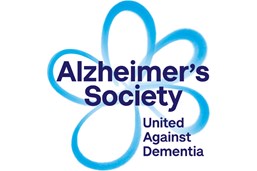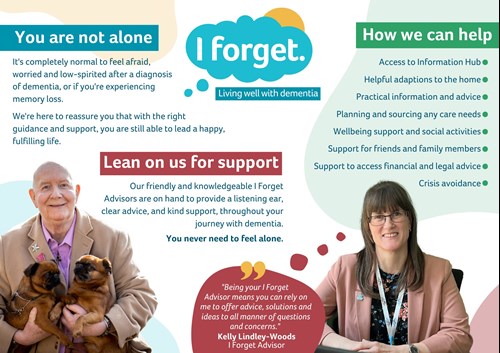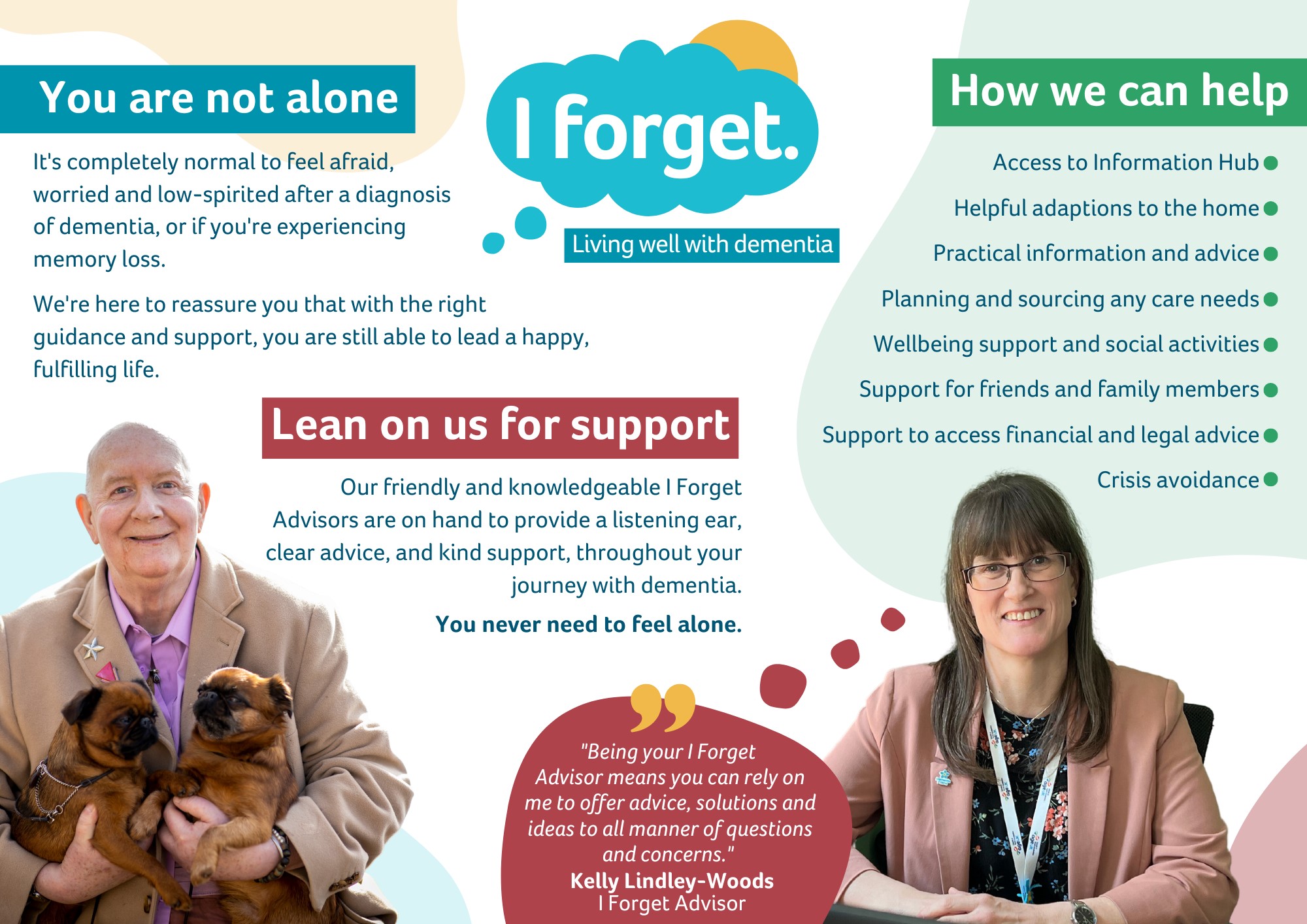Worried about your memory
If you’re having trouble remembering things or experiencing memory loss, it’s important you find out why. Here’s how.
Being forgetful or experiencing memory loss can cause stress and result in confusion, learn more here
Memory loss becomes more common as we age, and in some cases can be a symptom of dementia – but this often isn’t the case. Memory loss can be caused by several other issues like anxiety, stress, depression, vitamin B12 deficiency, delirium, thyroid issues, infections, or vascular problems. It can also be the result of physical damage caused by a head injury or a stroke.
Whatever the reasons, if you’re experiencing memory loss you should seek the advice and help of a professional. The sooner you speak to someone any treatment you may need will work better if it is started early.
What to do
If you are experiencing memory loss, or forgetfulness that’s affecting your day-to-day life then you should speak to your GP.
They will speak to you about your experiences, your family history and may also request a blood test. Your GP will discuss their view on your condition and may refer you to our Lincolnshire Memory Assessment Service if they feel it’s appropriate.
While you may be concerned your memory loss could be a symptom of dementia, it’s likely to be caused by something else.
Also did you know that 40% of all dementia cases are potentially preventable! There are many risk factors for dementia that you can change, with the right support. These changes mainly involve keeping your body and brain healthy and preventing damage to your brain.
Health Checks
The NHS Health Check aims to lower your risk of getting conditions that affect the heart and blood vessels, such as heart disease, stroke, kidney disease and dementia.
Just having one of these diseases can increase your risk of getting another which includes dementia, and the good news is these conditions can often be prevented. There are real benefits to having your health check when you are offered this, it can identify any early signs of health issues, and gives you advice on what you can do to make lifestyle changes that can reduce your risks and help that’s available.
The NHS Health Check service is available at GP practices across the Lincolnshire County Council catchment area. You are eligible for a health check if you are registered with a GP, it’s aimed at adults in England aged 40 to 74, it checks your vascular or circulatory health and works out your risk of developing some of the most disabling – but preventable – illnesses which include dementia. It is free of charge, including any follow-up tests or appointments.
Dementia
If you or a member of your family has a dementia diagnosis, visit The Memory Support Service this service is provided by Lincolnshire Partnership NHS Foundation Trust (LPFT). The service gives you access to a support worker who will provide guidance and advice throughout all stages of your dementia journey.
Support will include:
- understanding the diagnosis and what this could mean for you and your carer or loved ones.
- understanding the importance of planning for the future.
- accessing the right support to enable you to live in the local community for as long as possible.
- building resilience and confidence to manage the impact of the diagnosis.
- identifying the range of support services available for someone with this diagnosis or for those who are supporting you.
Alzheimer's Society
Through the Alzheimer’s Society website you can:

Dementia UK
Dementia UK — is a specialist dementia nursing charity that is there for the whole family. Learn more here.
Young Dementia Network
Dementia is described as ‘young onset’ when symptoms develop before the age of 65, usually between 30 to 65 years of age. The Network is an online influencing community working collaboratively to improve lives. People living with young onset dementia and their families are at its heart. Learn more here.
Memory Support Service
The Memory Support Service is provided by Lincolnshire Partnership NHS Foundation Trust (LPFT). The service is funded by Lincolnshire County Council. The service gives you access to a support worker who will provide guidance and advice throughout all stages of your dementia journey.
What is an Admiral Nurse
Admiral Nurses are specialist dementia nurses. Continually supported and developed by Dementia UK, they provide life-changing support for families affected by all forms of dementia – including Alzheimer’s disease. Admiral Nurses help people living with dementia stay independent for longer – and support the people caring for them so that they will have the strength to cope with the bad days, and the energy to enjoy the good days. To find out if there is an Admiral Nurse service in your area, contact the Helpline.
Living well with Dementia
Age UK
From keeping well, adapting your home and getting support, Age UK publishes advice online that can help guide you through if you are diagnosed with dementia. There’s also a postcode search on www.ageuk.org.uk that allows you to find the details of your local Age UK branch.
Age UK Lincoln & South Lincolnshire provide a I Forget service for those experiencing symptoms of memory loss and cognitive impairment with or without a diagnosis of dementia. Their friendly and knowledgeable advisors are on hand to provide a listening ear, clear advice, and kind support, throughout your journey with dementia. To refer yourself or a loved one to this free service please call 03455 564 144 or visit the website Age UK | Lincoln & South Lincolnshire.


Dementia Action Alliance (DAA) and Dementia Friendly Communities Groups (DFC) are where people living with dementia, organisations and businesses come together to help make the world more dementia friendly, helping people live well with dementia and remain a part of their community.
These groups can be contacted :
Louth & Skegness Area Dementia Friendly Community – Contact Jane Berni on Jane.Berni@e-lindsey.gov.uk
Lincoln Dementia Friendly Community – info@lslageuk.org.uk
Boston Dementia Action Alliance - Karen.Stengel@boston.gov.uk
There are many local groups and services around Lincolnshire that offer support and advice to people with dementia and their carers, search the Connect to Support community directories here
Joint Dementia Strategy 2018 - 2021
The Lincolnshire Joint Strategy for Dementia 2018 - 2021 has been reviewed and the new strategy will be available in April 24. This strategy sets out our vision and is an overview of how Lincolnshire NHS trusts, Adult Care and Community Wellbeing, will work together as a whole system across Voluntary, Community & Social Enterprise (VCSE), and beyond.
We have worked together with people that have lived experience of dementia and with partners to develop a new strategy that provides information on the priorities for dementia support and services in Lincolnshire over the next five years.
Dementia Programme Board (DPB)
The DPB was established in September 2022. It is a forum of clinicians and managers as nominated leads from across the partnership organisations, NHS, Health Trusts, PCNs, Social Care able to make decisions, who will lead and oversee Lincolnshire’s Dementia programme.
What does the DPB mean for people affected by dementia, carers and families?
The Board provides a forum to achieve improvements in the care of people with dementia and their families and carers in Lincolnshire. It is intended to promote good practice, pressing for progress in developing high quality services for people in Lincolnshire affected by dementia contact Lincolnshire Dementia Programme Board at licb.ldpb@nhs.net
Dementia Research
Did you know - you can help advance dementia care, diagnosis and treatments?
Why become a volunteer for dementia research?
- Dementia affects more than 900,000 people in the UK.
- Research offers hope. Only through research can we understand what causes dementia diseases, develop effective treatments and improve the care of those living with dementia.
- But for research to make progress we need more people with and without dementia to take part in vital studies.
- There are many different ways that you can help!
- Help beat dementia by signing up today.
When you sign up to Join Dementia Research, the information you provide is used to match you to studies you may be able to take part in, both online, nationally and in your local area.
Join dementia research - register your interest in dementia research : Home (nihr.ac.uk)
You can also join by phone by calling one of our charity Helpline numbers for help: (UK WIDE)
9am to 5pm, Monday to Friday.
 Alzheimer’s Society; 0333 150 3456 and please mention Join Dementia Research at the start of your call.
Alzheimer’s Society; 0333 150 3456 and please mention Join Dementia Research at the start of your call.

Herbert Protocol
The Herbert Protocol is a national scheme adopted by Lincolnshire Police and other police services across the country. It encourages carers, families, friends or neighbours, to hold information about the person with dementia that can help the police find them if they go missing.
The basis of the scheme is for vital information about the person such as medication, description, photograph, significant places in the person’s life and their daily routine, to be recorded on a form.
The form can be downloaded or printed from the Lincolnshire Police website or pick one up from your local police station.
Dementia Wristband
People living with dementia in Lincolnshire are now entitled to a free NFC Dementia Safeguarding Band.
If you are a carer or relative of someone who is living with dementia who is mobile within the community and you think a wristband would be of benefit then please email dementiasafeguarding@lincs.police.uk with the name of the person, you are requesting for. Include their date of birth and home address along with the requested name address and contact number and a member of the team will be in touch.









